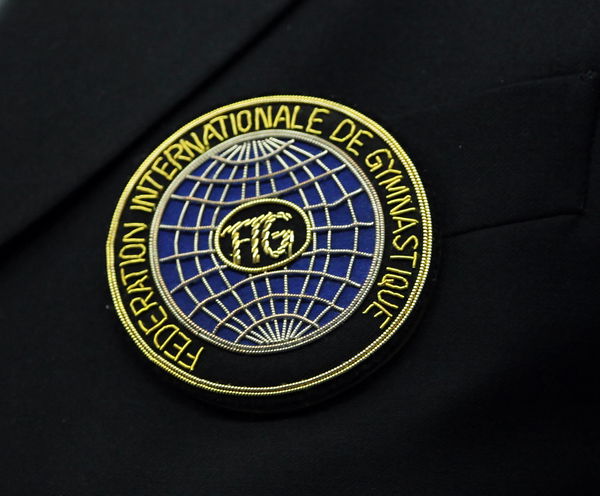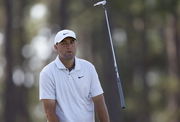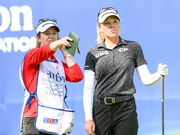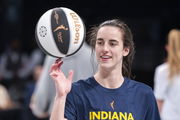
Imago
Bildnummer: 06593495 Datum: 26.09.2010 Copyright: imago/Schreyer shadow of Irina Tshashtshina, RUS, during the closing gala show at the Rhythmic Gymnastics World Championships 2010 in Moscow; 26/09/2010 ; ; Rhythmische Sportgymnastik RSG Gymnastik WM Moskau Damen Abschlussfeier Feier vdig xng 2010 quer Gymnastik RG RSG Rhythmische Sportgymnastik rhythmic gymnastics Frauen Mädchen girls women woman gymnastique rhythmique WM World Championships worlds 2010 Russia Moskau Moscow apparatus closing ceremony show Abschlussfeier Gala Olympiski Komplex playerRUS Irina Tshashtshina Chashchina shadow Schatten Federation Internationale de Gymnastique o0 Symbol Sportgymnastin Gymnastin Logo Emblem Objekte Verband FIG Schatten, Schattenspiel Image number 06593495 date 26 09 2010 Copyright imago Schreyer Shadow of Irina Tshashtshina RUS during The Closing Gala Show AT The Rhythmic Gymnastics World Championships 2010 in MOSCOW 26 09 2010 Rhythmic Gymnastic RSG Gymnastics World Cup Moscow women Closing Ceremony Celebrations Vdig 2010 horizontal Gymnastics RG RSG Rhythmic Gymnastic Rhythmic Gymnastics Women Girl Girls Women Woman Gymnastique Rhythmique World Cup World Championships Worlds 2010 Russia Moscow MOSCOW apparatus Closing Ceremony Show Closing Ceremony Gala Olympiski Complex playerRUS Irina Tshashtshina Shadow Shadow Federation International de Gymnastique o0 symbol Sportgymnastin Gymnastin emblem Emblem Objects Association FIG Shadow Shadow play

Imago
Bildnummer: 06593495 Datum: 26.09.2010 Copyright: imago/Schreyer shadow of Irina Tshashtshina, RUS, during the closing gala show at the Rhythmic Gymnastics World Championships 2010 in Moscow; 26/09/2010 ; ; Rhythmische Sportgymnastik RSG Gymnastik WM Moskau Damen Abschlussfeier Feier vdig xng 2010 quer Gymnastik RG RSG Rhythmische Sportgymnastik rhythmic gymnastics Frauen Mädchen girls women woman gymnastique rhythmique WM World Championships worlds 2010 Russia Moskau Moscow apparatus closing ceremony show Abschlussfeier Gala Olympiski Komplex playerRUS Irina Tshashtshina Chashchina shadow Schatten Federation Internationale de Gymnastique o0 Symbol Sportgymnastin Gymnastin Logo Emblem Objekte Verband FIG Schatten, Schattenspiel Image number 06593495 date 26 09 2010 Copyright imago Schreyer Shadow of Irina Tshashtshina RUS during The Closing Gala Show AT The Rhythmic Gymnastics World Championships 2010 in MOSCOW 26 09 2010 Rhythmic Gymnastic RSG Gymnastics World Cup Moscow women Closing Ceremony Celebrations Vdig 2010 horizontal Gymnastics RG RSG Rhythmic Gymnastic Rhythmic Gymnastics Women Girl Girls Women Woman Gymnastique Rhythmique World Cup World Championships Worlds 2010 Russia Moscow MOSCOW apparatus Closing Ceremony Show Closing Ceremony Gala Olympiski Complex playerRUS Irina Tshashtshina Shadow Shadow Federation International de Gymnastique o0 symbol Sportgymnastin Gymnastin emblem Emblem Objects Association FIG Shadow Shadow play
“Exactly 3️⃣ days to go for the BIGGEST RHYTHMIC GYMNASTICS WORLD CHAMPIONSHIPS ever… and Rio de Janeiro is already BREATHING gymnastics! The signs are everywhere! And you… ARE YOU READY?! ☀️🌊🤸🏻♀️” This was the caption of a post on FIG’s Instagram 7 days ago. The 2025 Rhythmic Gymnastics World Championships were being hyped, and why not? This was the 41st edition and also the first ever to be held in South America. But meanwhile, FIG had to issue an apology.
Watch What’s Trending Now!
The championships came to their conclusion today, and in the individual all-around, Germany’s Darja Varfolomeev defended her title, clinching gold ahead of Bulgaria’s Stiliana Nikolova and Italy’s Sofia Raffaeli. The U.S. squad, including Rin Keys, Megan Chu, and the Senior Group, earned 12th place in the team standings with a total of 253.600. In the Group All-Around, the U.S. Senior Group finished 31st, posting a combined score of 32.700, while Japan took the group title with 55.550. But Group All-Around is where the problem was.
The FIG wrote a letter today, addressed to the NFs participating in a Group in the RG WCH Rio de Janeiro 2025, stating, “We deeply regret the incident that occurred this afternoon during the group qualifications and extend our sincere apologies.” They also informed the President of the Superior Jury that during the break between Group A and Group B, some judges had raised concerns about the scoring system, as certain deductions didn’t appear to be reflected in the overall score.
ADVERTISEMENT
This indeed turned out to be true. About three-quarters of the way through the competition, they discovered a computer glitch affecting the artistry scores. This caused a nearly 50-minute pause while they fixed the scores for all the teams in both rounds. How was it dealt with?

Imago
41st World Gymnastics Championships in London Logo of the International Federation of Gymnastics in the Artistic World Gymnastics Championships at the O2 Arena in London, Britain, 18 October 2009. The 41st Artistic World Gymnastics Championships are taking place in the English capital from the 13th to the 18th of October 2009., Credit:FELIPE TRUEBA / Avalon UNITED KINGDOM PUBLICATIONxNOTxINxUKxFRAxUSA Copyright: xFELIPExTRUEBAx/xAvalonx 0559784465
The governing body of gymnastics wrote, “Thanks to the entry logs, we were able to re-enter all the data initially recorded by each judge on their tablets and recalculate the scores. For this reason, your scores have been slightly adjusted. However, we can confirm that they are now correct and accurately reflect what took place during the performance of your Group.” So all in all, there was a computer malfunction discovered in the scoring, and they used the entry logs from the judges to reconstruct the proper scores.
ADVERTISEMENT
This is not the first time this year that scoring has been under the light. At the 2025 U.S. Classic, Myli Lew’s uneven bars routine got a surprising 14.050 score despite repeated elements and composition errors. Fans and experts questioned the fairness, sparking debates about judging consistency and its impact on athletes.
But more interestingly, the 2024 Rhythmic Gymnastics World Championships faced scoring problems, too.
ADVERTISEMENT
2024 Rhythmic Gymnastics World Championships on the same line
Last year, in May 2024, the International Gymnastics Federation (FIG) identified a significant scoring error at the Rhythmic Gymnastics World Cup in Athens.
An internal review revealed that the scores from the A1 and E1 judges had been mistakenly reversed during the Individual Clubs and Ribbon qualification events. This error led to incorrect qualification rankings and finalists. Consequently, the World Cup ranking published after the event was also incorrect. What did FIG do?
ADVERTISEMENT
The gymnastics governing body removed all results for this event from its website and later published corrected ones. Thanks to this, the right athlete won their event.
Top Stories
Greg Biffle’s House Burglary Suspect Identified After Officials Release Security Camera Footage – Report

Scottie Scheffler Injures Fan in the Head at American Express as Painful Moment Is Caught on Camera

‘Hideous’: Jason Day Sparks Outrage With Outfit Choice at PGA Tour Season Debut

Brooke Henderson Ends 10-Year Caddie Partnership With Sister After Major Personal Announcement

Indiana Fever Makes WNBA Announcement on Caitlin Clark’s 24th Birthday

Josh Allen’s Strong Stance on Sean McDermott’s Exit Revealed After Owner Shared Bills QB’s Role in HC’s Firing

Darja Varfolomeev of Germany dominated, winning the all-around plus clubs and ball titles. China’s Wang Zilu took the hoop, and Italy’s Sofia Raffaeli won the ribbon. In group events, Italy won 5 hoops, and China won the combination routine. The final World Challenge Cup in Cluj added two more apparatus wins for Varfolomeev ahead of the Paris Olympics.
Additionally, the FIG announced that the scoring provider for this event, “Best Solutions International, Computer Systems & Software” (BUL), would no longer be accepted as a scoring and results partner for any FIG-approved or sanctioned events until further notice. The FIG strongly recommended that other competitions refrain from using the services of this provider.
ADVERTISEMENT
ADVERTISEMENT
ADVERTISEMENT
ADVERTISEMENT